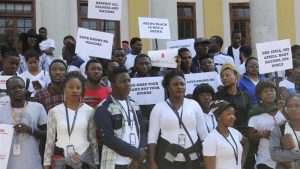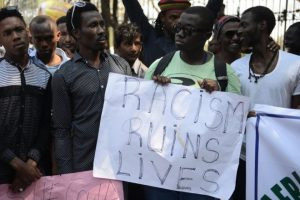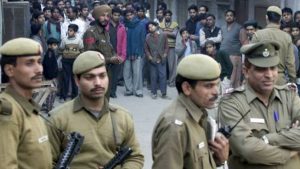 India’s burgeoning ties with Africa have come under strain with New Delhi-based African envoys calling for an international inquiry into recent brutal attacks on Nigerian students in a satellite town of the Indian capital. What is disturbing for India is that these attacks, which were the handiwork of some criminals and malcontents, have been described as “racist” and “xenophobic” by the African envoys, indicating that these were expressions of ingrained racist prejudice and hatred.
India’s burgeoning ties with Africa have come under strain with New Delhi-based African envoys calling for an international inquiry into recent brutal attacks on Nigerian students in a satellite town of the Indian capital. What is disturbing for India is that these attacks, which were the handiwork of some criminals and malcontents, have been described as “racist” and “xenophobic” by the African envoys, indicating that these were expressions of ingrained racist prejudice and hatred.
What was galling for India’s foreign office was that the Dean of African Diplomatic Corps, who issued the blistering statement on the attacks on behalf of other envoys, also alleged that “no sufficient and visible deterrent action” was taken against the perpetrators.”
In a strongly-worded statement, the Dean of African Heads of Mission said that the attacks were “xenophobic and racial” and that Indian authorities had failed to “sufficiently condemn” the attacks or take “visible deterring measures”. Five Nigerian students were attacked while another was beaten up in a shopping mall last month in Greater Noida in the northern Indian state of Uttar Pradesh, bordering Delhi. The attacks followed the death of an Indian teenager due to a drug overdose and his parents blamed Nigerian students for giving him the narcotics. Police said five people have been arrested in connection with the violence against the Nigerians and India’s External Affairs Minister Sushma Swaraj has promised an “impartial” inquiry into the incidents. The minister also spoke to Uttar Pradesh Chief Minister Yogi Adiyanath and pressed for speedy action against perpetrators.
However, the African Heads of Mission said that the authorities’ response was “inadequate” and called for an investigation by the UN Human Rights Council. They also called for “strong condemnation from the highest political level (both nationally and locally) of the government of India as well as expediting legal actions against the perpetrators”.
 There have been a series of incidents in recent years in which people from African countries living in different parts of India have been attacked. In May 2016, a Congolese man was beaten to death in Delhi after an argument over an auto-rickshaw. Three months prior to that, a Tanzanian student was assaulted by a mob in the southern Indian city of Bengaluru, considered the Silicon Valley of India for being a software hub. A Nigerian man living in Goa was stabbed to death in 2013. The incidents in 2016 had even elicited a threat from the African envoys here to boycott the Africa Day celebrations in India. But the envoys had withdrawn the threat.
There have been a series of incidents in recent years in which people from African countries living in different parts of India have been attacked. In May 2016, a Congolese man was beaten to death in Delhi after an argument over an auto-rickshaw. Three months prior to that, a Tanzanian student was assaulted by a mob in the southern Indian city of Bengaluru, considered the Silicon Valley of India for being a software hub. A Nigerian man living in Goa was stabbed to death in 2013. The incidents in 2016 had even elicited a threat from the African envoys here to boycott the Africa Day celebrations in India. But the envoys had withdrawn the threat.
Disturbing Issues: Racist & Xenophobic?
These sporadic attacks have raised disturbing issues, including the troubling question of whether there is a deep-seated racist prejudice among Indians against Africans. More than 20,000 African students study in different institutions across India. The government, on its part, has denied any systematic targeting of Africans and blamed it on local miscreants. In this case, a statement issued by the External Affairs Ministry on April 3 rejected the attempt to categorise these attacks as racist and highlighted that these were “aberrations that represent act of a few criminals”.
What India has done so far
 “It is unfortunate that a criminal act triggered following the untimely death of a young Indian student under suspicious circumstances has been termed as xenophobic and racial,” said the ministry. Dismissing the claim that the violence against the Africans was racially motivated, the ministry underlined that local authorities had expeditiously arrested suspects and the government had condemned and described the attack as unacceptable. “The significance attached to addressing the matter is reflected in the detailed statement by the External Affairs Minister (EAM) and the discussion in Parliament,” it said.
“It is unfortunate that a criminal act triggered following the untimely death of a young Indian student under suspicious circumstances has been termed as xenophobic and racial,” said the ministry. Dismissing the claim that the violence against the Africans was racially motivated, the ministry underlined that local authorities had expeditiously arrested suspects and the government had condemned and described the attack as unacceptable. “The significance attached to addressing the matter is reflected in the detailed statement by the External Affairs Minister (EAM) and the discussion in Parliament,” it said.
Rebutting the charge of no sufficient deterrent action, ministry pointed out several steps taken by the government and cautioned against jumping to conclusions as the police have registered an FIR and “are investigating the matter comprehensively.” “Local authorities have also taken measures to strengthen safety and security of Nigerian nationals. Coordination meetings have been held by local police in Delhi as well as Greater Noida, with African nationals. Ministry of External Affairs has further sensitised local authorities towards ensuring safety and security of Africans in general and African students in,” said the statement.
What it means for India-Africa relations

Sadly, these attacks on Africans have come at a time when India is looking to scale up its engagement with Africa across the spectrum. The last three years have seen a marked upswing in India-Africa relations, with India hosting the largest summit with the continent by inviting leaders and representatives of all 54 African countries to the third summit in New Delhi in October 2015. This period has also seen a record number of high-level visits to African countries from India, with the prime minister, president and vice-president visiting over 15 African countries. India-Africa trade has surpassed $70 billion, with more Indian companies looking to invest in the African opportunity.
But, unfortunately, as these attacks on African nationals show, this visible across-the-board acceleration in India-Africa engagement has not translated into an appreciation and understanding of African culture, which has bred distorting stereotypes. Taking a long-range view, it’s necessary for both sides to invest more resources in sensitisation and building mutual popular goodwill if one wants to change the narrative of India-Africa relations on the ground.
(Pallab Bhattacharya contributed inputs to this article)
Author Profile

- Manish Chand is Founder and Editor-in-Chief of India Writes Network (www.indiawrites.org) and India and World, a pioneering magazine focused on international affairs. He is CEO, Centre for Global India Insights, an India-based think tank focused on global affairs.
Latest entries
 India and the WorldFebruary 17, 2026South-by-South: Focus on people-centric solutions at India AI summit
India and the WorldFebruary 17, 2026South-by-South: Focus on people-centric solutions at India AI summit India and the WorldFebruary 7, 2026Modi hails interim India-US trade deal, Goyal says no concessions made on agriculture
India and the WorldFebruary 7, 2026Modi hails interim India-US trade deal, Goyal says no concessions made on agriculture India and the WorldFebruary 2, 2026Trump announces trade deal with India, Modi ‘delighted’
India and the WorldFebruary 2, 2026Trump announces trade deal with India, Modi ‘delighted’ India and the WorldJanuary 31, 2026Palestinian minister bats for mediatory role for India in ending Gaza conflict
India and the WorldJanuary 31, 2026Palestinian minister bats for mediatory role for India in ending Gaza conflict







